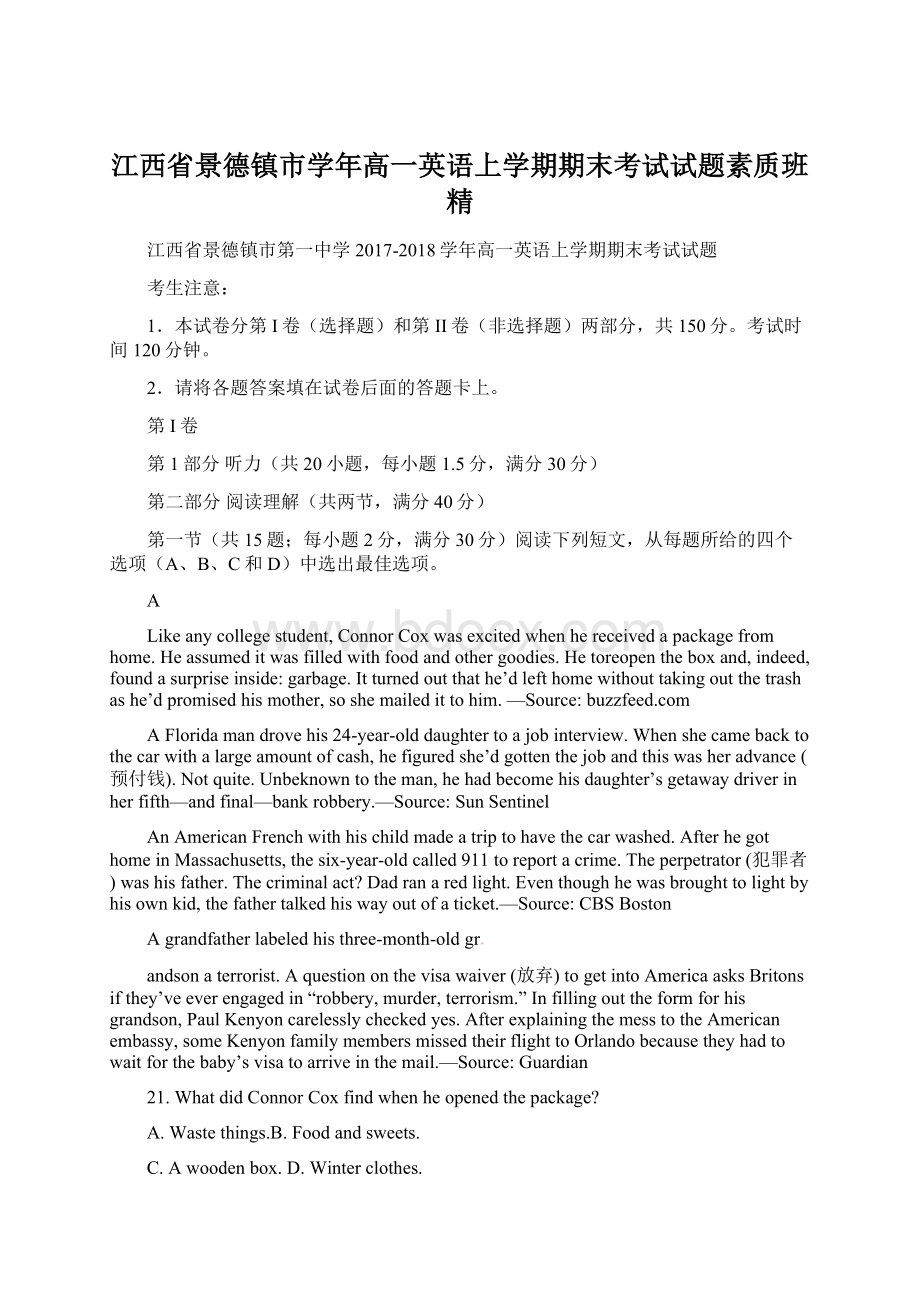江西省景德镇市学年高一英语上学期期末考试试题素质班 精.docx
《江西省景德镇市学年高一英语上学期期末考试试题素质班 精.docx》由会员分享,可在线阅读,更多相关《江西省景德镇市学年高一英语上学期期末考试试题素质班 精.docx(9页珍藏版)》请在冰豆网上搜索。

江西省景德镇市学年高一英语上学期期末考试试题素质班精
江西省景德镇市第一中学2017-2018学年高一英语上学期期末考试试题
考生注意:
1.本试卷分第I卷(选择题)和第II卷(非选择题)两部分,共150分。
考试时间120分钟。
2.请将各题答案填在试卷后面的答题卡上。
第I卷
第1部分听力(共20小题,每小题1.5分,满分30分)
第二部分阅读理解(共两节,满分40分)
第一节(共15题;每小题2分,满分30分)阅读下列短文,从每题所给的四个选项(A、B、C和D)中选出最佳选项。
A
Likeanycollegestudent,ConnorCoxwasexcitedwhenhereceivedapackagefromhome.Heassumeditwasfilledwithfoodandothergoodies.Hetoreopentheboxand,indeed,foundasurpriseinside:
garbage.Itturnedoutthathe’dlefthomewithouttakingoutthetrashashe’dpromisedhismother,soshemailedittohim.—Source:
AFloridamandrovehis24-year-olddaughtertoajobinterview.Whenshecamebacktothecarwithalargeamountofcash,hefiguredshe’dgottenthejobandthiswasheradvance(预付钱).Notquite.Unbeknowntotheman,hehadbecomehisdaughter’sgetawaydriverinherfifth—andfinal—bankrobbery.—Source:
SunSentinel
AnAmericanFrenchwithhischildmadeatriptohavethecarwashed.AfterhegothomeinMassachusetts,thesix-year-oldcalled911toreportacrime.Theperpetrator(犯罪者)washisfather.Thecriminalact?
Dadranaredlight.Eventhoughhewasbroughttolightbyhisownkid,thefathertalkedhiswayoutofaticket.—Source:
CBSBoston
Agrandfatherlabeledhisthree-month-oldgr
andsonaterrorist.Aquestiononthevisawaiver(放弃)togetintoAmericaasksBritonsifthey’veeverengagedin“robbery,murder,terrorism.”Infillingouttheformforhisgrandson,PaulKenyoncarelesslycheckedyes.AfterexplainingthemesstotheAmericanembassy,someKenyonfamilymembersmissedtheirflighttoOrlandobecausetheyhadtowaitforthebaby’svisatoarriveinthemail.—Source:
Guardian
21.WhatdidConnorCoxfindwhenheopenedthepackage?
A.Wastethings.B.Foodandsweets.
C.Awoodenbox.D.Winterclothes.
22.WhatdoestheunderlinedpartinParagraphThreeprobablymean?
A.Thefathergotaticket.B.Thefatherlosthisway.
C.Thefatherdidn’tgetfined.D.Thefathertalkedalotwithhisson.
23.WhydidKenyonfamilymembersmisstheirflight?
A.Becausetheyhadtowaitforthebaby’s
visa.
B.Becausetheyfailedtotakevisaswiththem.
C.Becausetheflightwascontrolledbyterrorists.
D.Becausetheywantedtochangeotherflights.
24.Whatdothefourstorieshaveincommon?
A.TheyallhappenedinAmerica.
B.Theyallcamefromtheinternet.
C.Theywereallsurprisingandinteresting.
D.Theyallhappenedbetweenparentsandchildren.
B
TwoofthesaddestwordsintheEnglishlanguageare“ifonly”.Ilivemylifewiththegoalofneverhavingtosaythosewords,becausetheyconveyregret,lostopportunities,mistakes,anddisappointment.
Myfatherisfamousinourfamilyforsaying,“Taketheextraminutetodoitright.”Ialwaystrytolivebythe“extraminute”rule.Whenmychildrenwereyoungandlikelytocauseaccidents,IalwaysthoughtaboutwhatIcoulddotoavoidan“ifonly”moment,whetheritwassomethingminorlikemovingacupfullofhotcoffeeawayfromtheedgeofacounter,orsomethingthatrequiredalittlemoreworksuchastapingpadding(衬垫)ontothesharpcornersofaglasscoffeetable.
Idon’tonlyavoidthose“ifonly”momentswhenitcomestosafety.It’sequallyimportanttoavoid“ifonly”inourpersonalrelationships.Weallknowpeoplewholostalovedoneandregrettedthattheyhadforgoneanopportunitytosay“Iloveyou”or“Iforgiveyou”.WhenmyfatherannouncedhewasgoingtotheeyedoctoracrossfrommyofficeonGoodFriday,ItoldhimthatitwasaholidayformycompanyandIwouldn’tbehere.ButthenIthoughtaboutthefactthathe’s84yearsoldandIrealizedthatIshouldn’tmissanopportunitytoseehim.IcalledhimandtoldhimIhaddecidedtogotoworkonmydayoffafterall.
IknowtherewillstillbeoccasionswhenIhavetosayifonlyaboutsomething,butmylifeisdefinitelybetterbecauseofmypolicyofdoingeverythingpossibletoavoidthateventuality.Andeven
thoughittakesanextraminutetodosomethingright,oritoccasionallytakesanhourortwoinmybusyscheduletomakeapersonalconnection,IknowthatI’mdoingtherightthing.I’mbuyingmyselfpeaceofmindandthat’sthebestkindofinsuranceformyemotionalwell-being.
25.Whydoesthewriterregard“ifonly”astwoofthesaddestwordsintheEnglishlanguage?
A.Becausepeopleusethemwhentheyfeelsad.
B.Becausetheyexpressregretanddisappointmentinlife.
C.Becausetheyremindthewriterofsomesadexperiences.
D.BecausetheymeansadintheEnglishlanguage.
26.What’sthemeaningoftheunderlinedword“foregone”inParagraph3?
A.Givenup.B.Comeacross.
C.Gotthrough.D.Heldback.
27.TheauthordecidedtogotoherofficeonGoodFridayto.
A.seeadoctorB.finishherwork
C.joinacelebrationD.accompanyherfather
28.Whatisthebesttitleforthepassage?
A.AdvicefromMyFather
B.AvoidanceofSaying“IfOnly”
C.The“ExtraMinute”Rule
D.TheImportanceofEmotionalWell-being
C
You’llprobablynevergotoMarsorsingonthestagewiththeRollingStones.Butifvirtualreality(VR)everlivesuptoitspromise,youmightbeabletodoallthesethings—andmanymore—withoutevenleavingyourhome.Unlikerealreality,virtualrealitymeanssimulatingbitsofourworld.Apartfromgamesandentertainment,it’slongbeenusedfortrainingairlinepilotsandsurgeonsandforhelpingscientiststofigureoutcomplexproblemssuchasthestructureofproteinmolecules(分子).Thenhowdoesitwork?
Closeyoureyesandthinkofvirtualrealityandyouprobablypicturesomethinglikethis:
amanwearingawrap-aroundheadsetanddatagloveswiredintoapowerfulworkstationorsupercomputer.WhatdistinguishesVRfromanordinarycomputerexperienceisthenatureoftheinputandoutput.Whereanordinarycomputerusesthingslikeakeyboard,mouse,orspeechrecognitionforinput,VRusessensorsthatdetecthowyourbodyismoving.AndwhereaPCdisplaysoutputon
ascreen,VRusestwoscreens(oneforeacheye),surround-soundspeakers,andmaybesomeformsoftouchandbodyfeedbackaswell.
VRhasbeenroutinelyusedbyscientists,doctors,dentists,engineers,architects,archaeologists,andthemilitaryforaboutthelast30years.Difficultanddangerousjobsarehardtotrainfor.Howcanyousafelypracticetakingatriptospace,makingaparachutejump,orcarryingoutbrainsurgery?
Althese
thingsareobviouscandidatesforvirtualrealityapplications.
Likeanytechnology,virtualrealityhasbothgoodandbadpoints.Criticsalwaysraisetheriskthatpeoplemaybeaddictedtoalternativerealitiestothepointofignoringtheirreal-worldlives—butthatcriticismhasbeenleveledateverythingfromradioandTVtocomputergamesandtheInternet.Likemanytechnologies,VRtakeslittleornothingawayfromtherealworld:
youdon’thavetouseitifyoudon’twantto.
29.Paragraph3ismainlyabout.
A
.theprinciplesofvirtualreality
B.theapplicationsofvirtualreality
C.thehistoryofvirtualreality
D.theinfluencesofvirtualreality
30.Accordingtothepassage,virtualrealitymeans.
A.imaginingbeautifulthingsinourmind
B.creatingsomethingthatdoesn’texist
C.experiencingthingsthatdon’treallyexist
D.cloningsomethingthathasdiedout
31.Whatisthewriter’sattitudetowardsVR?
A.Appreciative.B.Cautious.
C.Skeptical.D.Indifferent.
D
AccordingtonewresearchfromtheUniversityofCambridgeinEngland,sheepareabletorecognizehumanfacesfromphotographs.
Thefarmanimals,whoaresocialandhavelargebrains,werepreviouslyknowntobeabletorecognizeoneanother,aswellasfamiliarhumans.However,theirabilitytorecognizehumanfacesfromphotosaloneisnovel.
Therecentstudy,theresultsofwhichwerepublishedinthejournal
RoyalSociety:
OpenScience.Showthewoollycreaturescouldbetrainedtorecognizestillimagesofhumanfaces,includingthoseofformerPresidentBarackObamaandactressEmmaWatson.
Initially,thesheepweretrainedloapproachcertainimagesbybeinggivenfoodrewards.Later,theywerea
bletorecognizetheimagesforwhichtheyhadbeenrewarded.Thesheepcouldevenrecognizeimagesoffacesshownatanangle,thoughtheirabilitytodosodeclinedbyabout15percent—thesamerateatwhichahuman’sabilitytoperformthesametaskdeclines.
“Anyonewhohasspenttimeworkingwithsheepwillknowthattheyareintelligent,individualanimalswhoareabletorecognizetheirhandlers,”saidProfessorJennyMorton,wholedtheCambridgestudy.“We’veshownwithourstudythatsheephaveadvancedface-recognitionabilities,comparablewiththoseofhumansandmonkeys.”
Recognizingfacesisoneofthemostimportantsocialskillsforhumanbeings,andsomedisordersofthebrain,includingHuntington’sdisease,affectthisability.
“Sheeparelong-livedandhavebrainsthataresimilarinsizeandcomplexitytothoseofsomemonkeys.Thatmeanstheycanbeusefulmodelstohelpusunderstanddisordersofthebrain,suchasHuntington’sdisease,thatdevelopoveralongtimeandaffectcognitiveabilities.Ourstudygivesusanotherwaytomonitorhowtheseabilitieschange,”Mortonsaid.
32.Accordingtothenewresearch,what’sunusualaboutsheep?
A.Theyhavelargebrains.
B.Theycanrecognizetheirowners.
C.Theycantellanimalsfromhumans.
D.Theycanrecognizehumanfacesfromphotographs.
33.Howdidtheresearcherstrainthesheep?
A.Byguidingthemtofollowtheirhandlers.
B.Bygivingfoodrewards.
C.Byshowingphotosofhumansandmonkeysbyturns.
D.Byshowingphotosoffamouspeople.
34.Whatcanbeinferredfromthepassage?
A.Sheephaveahigherface-recognitionabilitythanmon